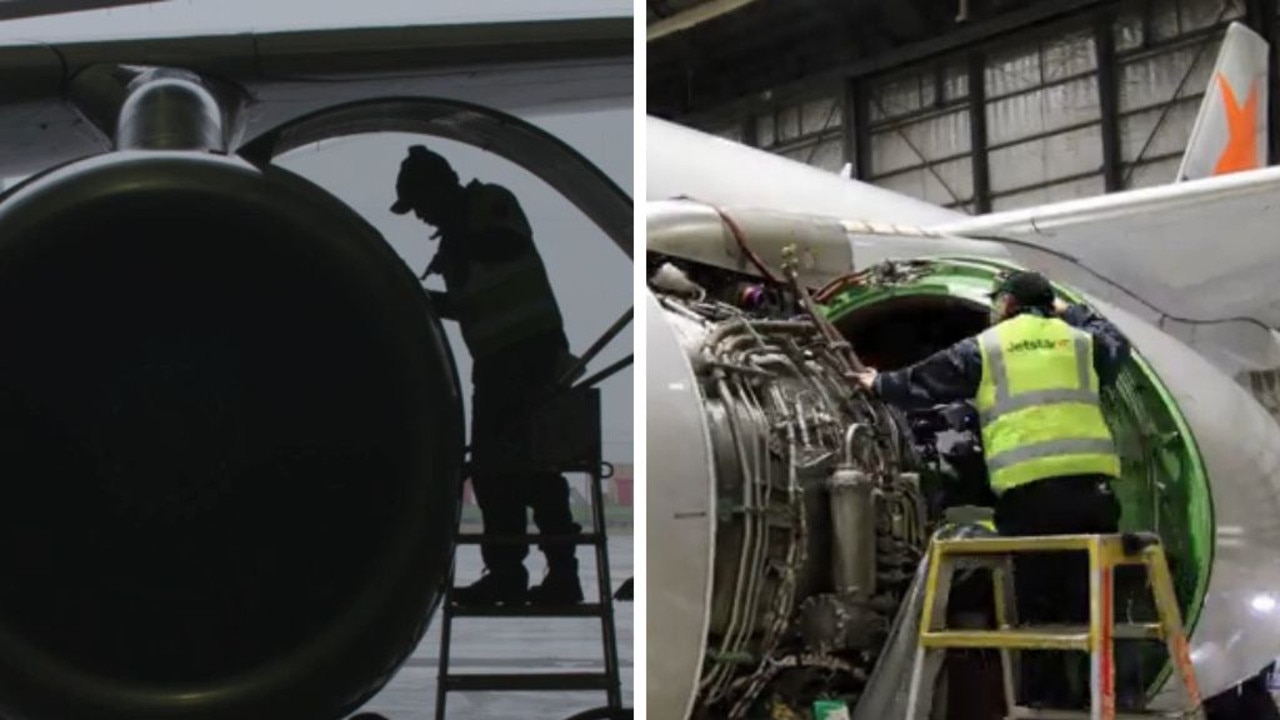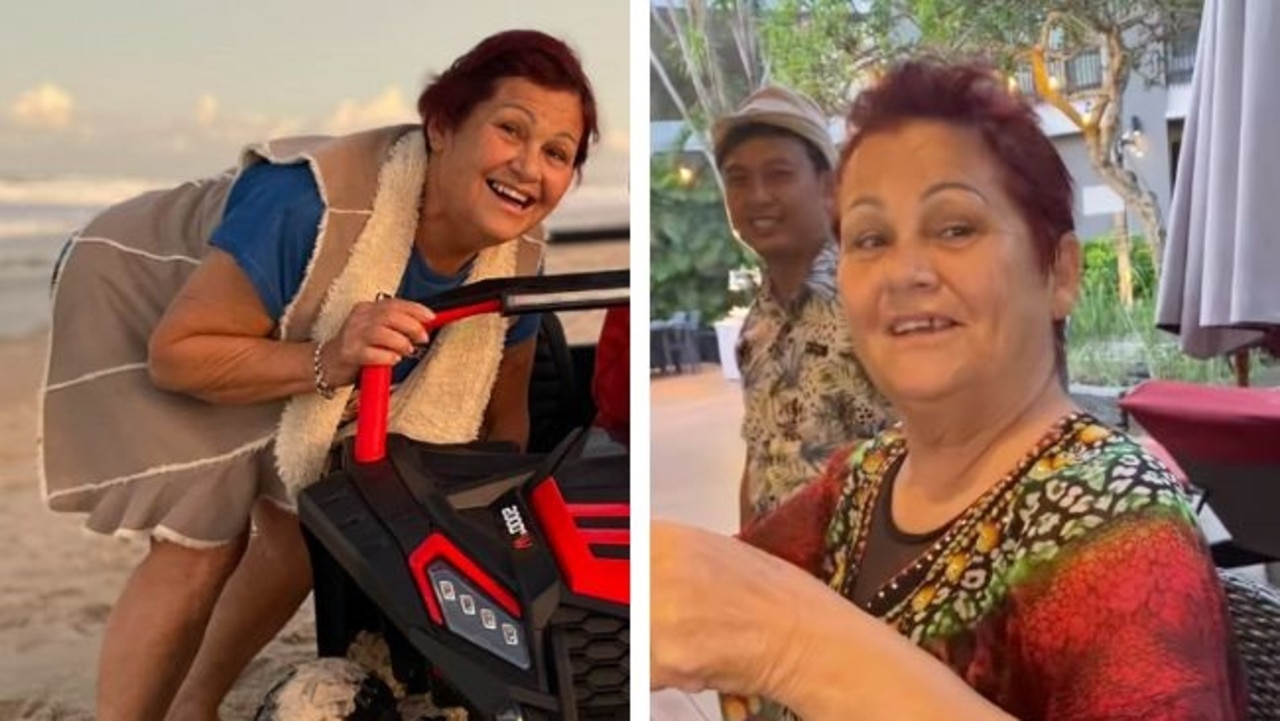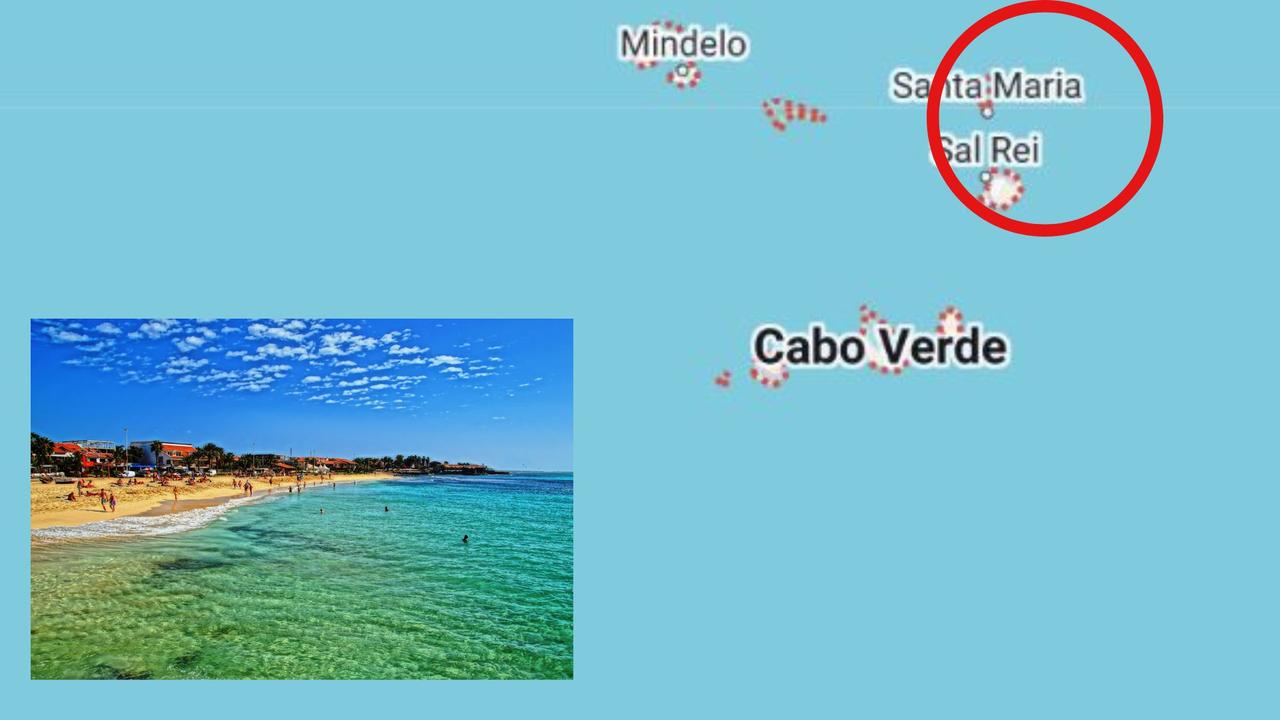‘Profound regret’ over second wave
The Victorian health department’s top public servant has expressed ‘profound regret’ over the state’s second COVID-19 wave.
The Victorian health department’s top public servant has expressed “profound regret” over the state’s second COVID-19 wave.
During heated questioning, Arthur Moses SC for Unified Security, put to Department of Health and Human Services secretary Kym Peake if she accepted there were flaws in the hotel quarantine program.
“You know that old quote, true leaders take responsibility?” Mr Moses asked during the hotel quarantine inquiry on Wednesday.
“Do you accept, sitting here today, that there were deficiencies in the hotel quarantine program because your department did not discharge the functions that it had been provided for in the Operation Soteria plan. Do you accept that?”
“No I don’t,” she replied.
“It’s a matter of profound regret to me as the secretary of the Department of Health and Human Services that we experienced a second wave in Victoria and all the consequences that came with that.
“I know my staff and the staff of DJPR spent hundreds of hours seeking to prevent that outcome.
“It wasn’t perfect but there was enormous care and diligence to continuously address risks as they arose.
“I’m of the view that the control structures that were in place were appropriate.
“There are absolutely lessons and improvements to take.
“But the way you put that proposition to me, I could not accept.”
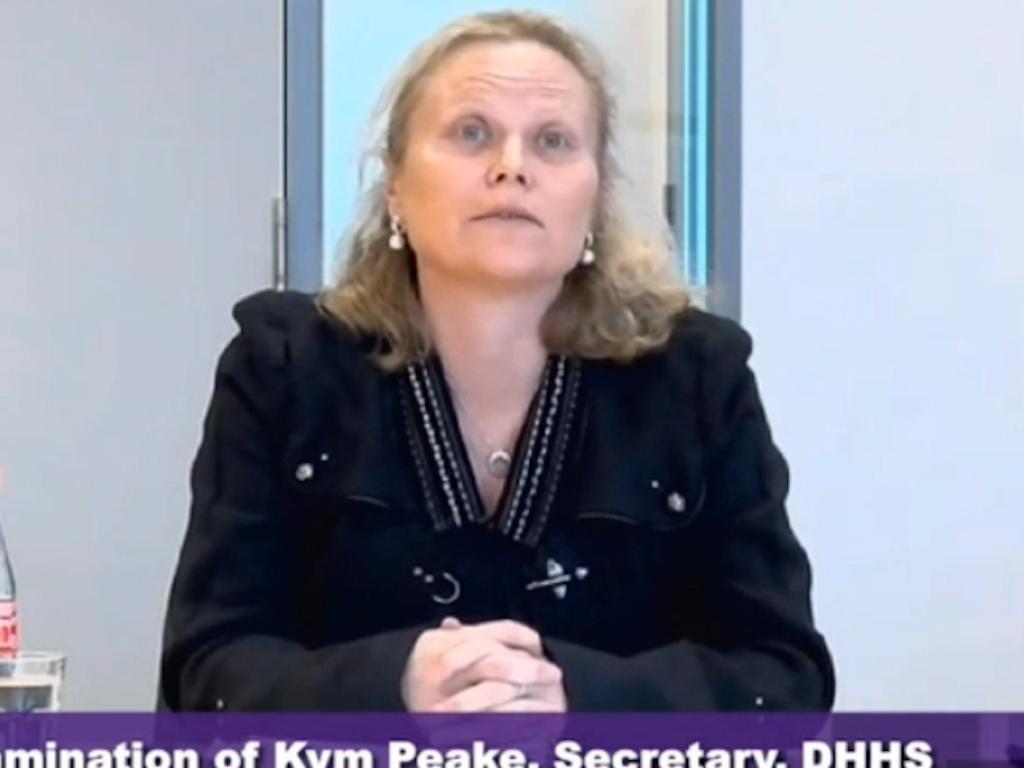
The emotional moment came after Police Minister Lisa Neville gave some context to a “cranky” text in which she questioned the use of the army to guard hotels three months into the troubled program.
In her June 25 text exchange with Emergency Management Commissioner Andrew Crisp, Ms Neville asked about the proposed use of the defence force in the program as an interim option, while police or protective services officers were considered to replace security guards.
“Not sure what they do at hotels given no one leaves!! And they have no powers,” Ms Neville texted.
She told the inquiry on Wednesday that at the time of sending the text she was “cranky” about learning of the proposal in a news report.
“You just need to see it in context that I was still slightly cranky about the fact that I discovered the whole thing by the Herald Sun article just after midnight. I was still relatively annoyed about it,” she said.
Ms Neville said the use of army personnel needed to be weighed up carefully.
“There’s no question and again not a criticism: we need to show the Commonwealth that our ADF are used to fill gaps, that we can’t do it within our own resources and … there is an issue, because the ADF cannot enforce,” she said.
At the time the texts were sent, problems about security guards not complying with infection control procedures were well known and COVID-19 outbreaks had occurred from hotel settings.
Corrections officers were eventually installed to take over guarding hotel quarantine.
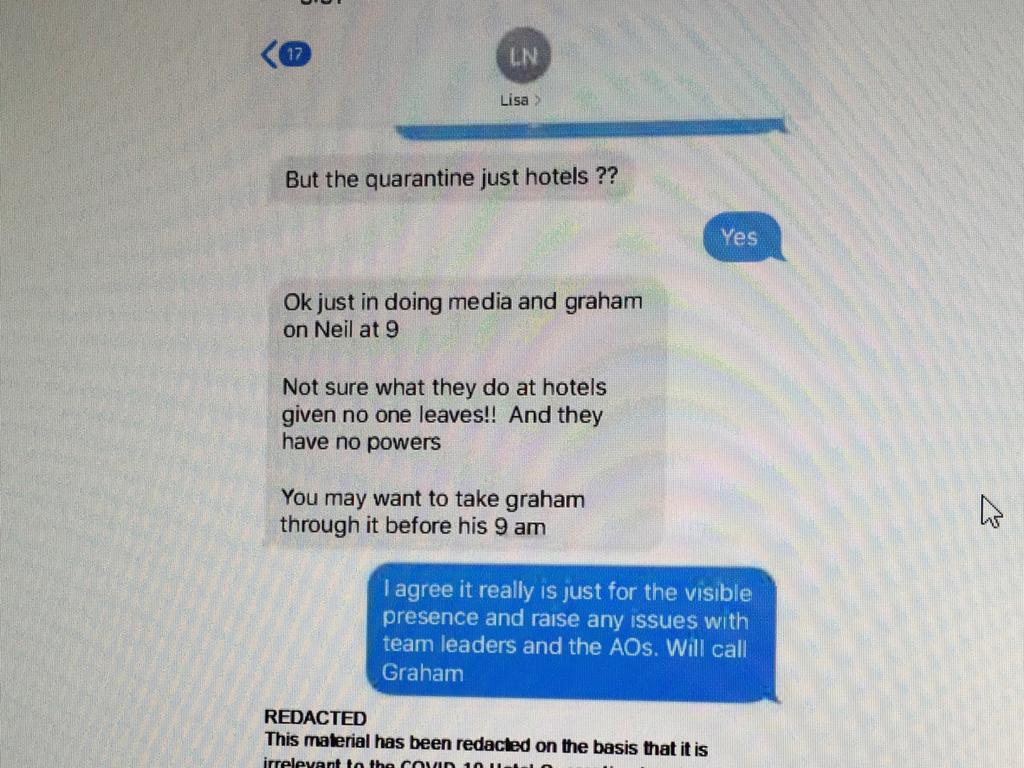
Meanwhile, Ms Peake conceded there were shortcomings with the hotel quarantine program but there was “continuous improvement”.
“There was continuous improvement as each risk and issue was identified,” she told the inquiry.
“It wasn’t just my department. I think the evidence led by the Department of Jobs, Precincts and Regions was they did the same.”
Ms Peake she didn’t feel qualified to respond to shortcomings on infection control procedures, because her department had only partial responsibility for that aspect.
The inquiry has heard the onus was on security companies, through their contract arrangements, to ensure their workers met infection control procedures.
The health department provided advice on the measures to security staff at hotels.
Ms Peake said initially having the support of the Department of Jobs, Precincts and Regions, which organised logistics of the hotel quarantine scheme, was welcomed.
However, by the end of May, there was a view it would have been easier if one department had responsibility for the scheme.
“As the program went on, it did gradually become clear it was more complex to have a joint operation on the ground and it would be better for those responsibilities to be consolidated in a single agency,” she said.
She agreed it was always open to her department to transfer the administration of contracts such as security and cleaning from DJPR.
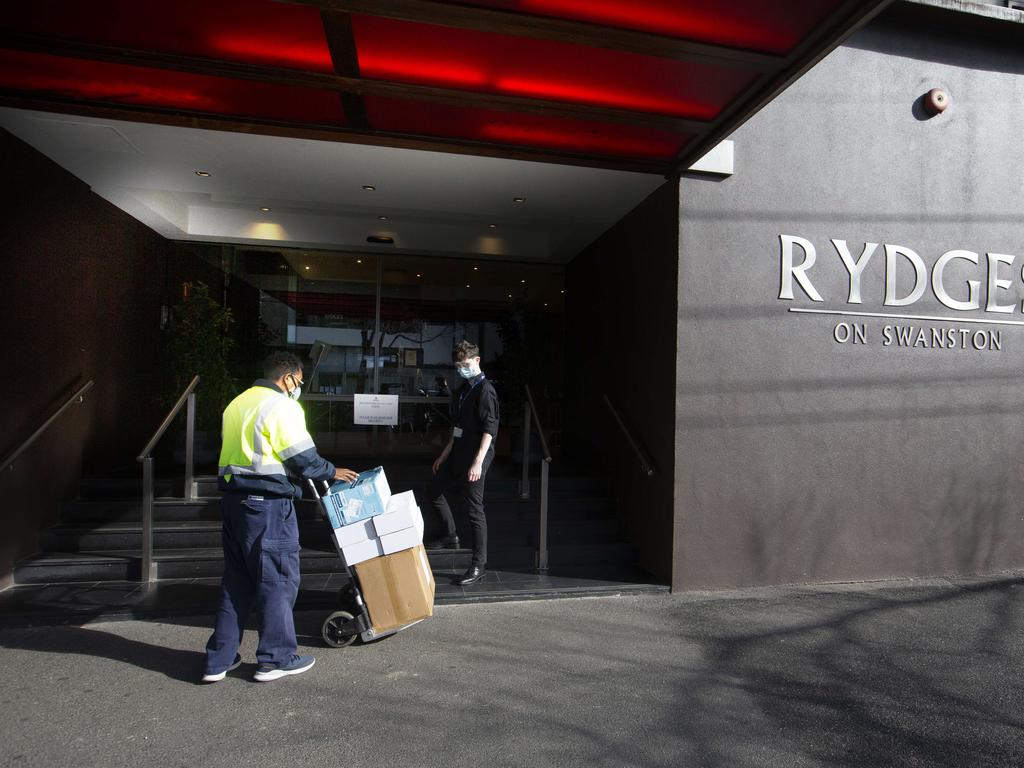
Ms Peake said it was not until June that she became aware of a “systemic” issue with risks posed by the casual nature of the security workforce.
“The casualised nature of workforce is not something I’d been aware of and was a risk to the program,” she told the inquiry.
She said the minister was told about the risk and rapid work was done to find an alternative workforce.
Counsel assisting Ben Ihle suggested it was up to Ms Peake’s department to have ensured the right people were in the job and asked if it had done a review.
Ms Peake said a review was not done before then, because it wasn’t until mid June that she learnt of the concerns.
Until that point, any incidents were managed locally.
“But really until the middle of June, it had not crystallised there was a systemic risk about casualised risks of the workforce,” she said.
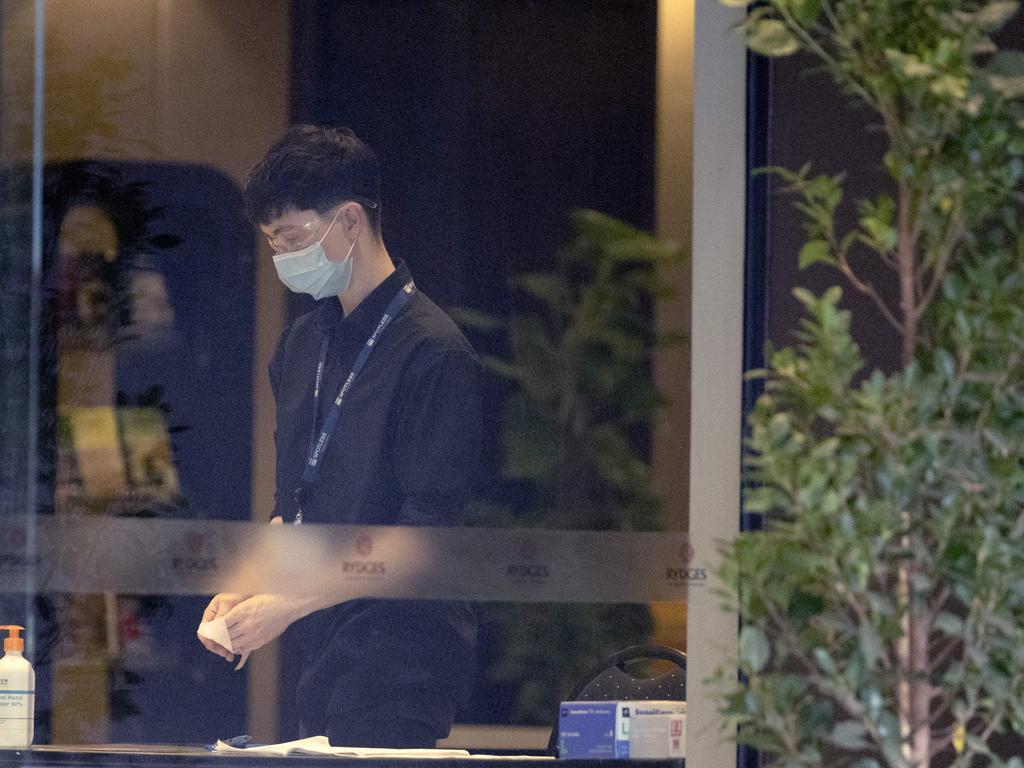
The inquiry was also told that a call by three senior government health practitioners for an urgent review of the program just a week after it began did not make its way to Health Minister Jenny Mikakos.
Deputy public health commander Dr Finn Romanes emailed senior staff on April 9, demanding an “urgent review governance” of the program, given the apparent “lack of a unified plan”.
The email was backed by Chief Health Officer Brett Sutton and his deputy Annaliese van Diemen.
Under the headline of “governance’’, Dr Romanes said Prof Sutton and Dr van Diemen were “formally requesting an urgent review (of) governance of the mandatory quarantine (detention) programme, also known as Operation Soteria, to be conducted this afternoon, with new and clear arrangements to be established by 8pm this evening.’’
Ms Peake said she didn’t raise the concerns highlighted with Ms Mikakos because she was satisfied the issues had been addressed.
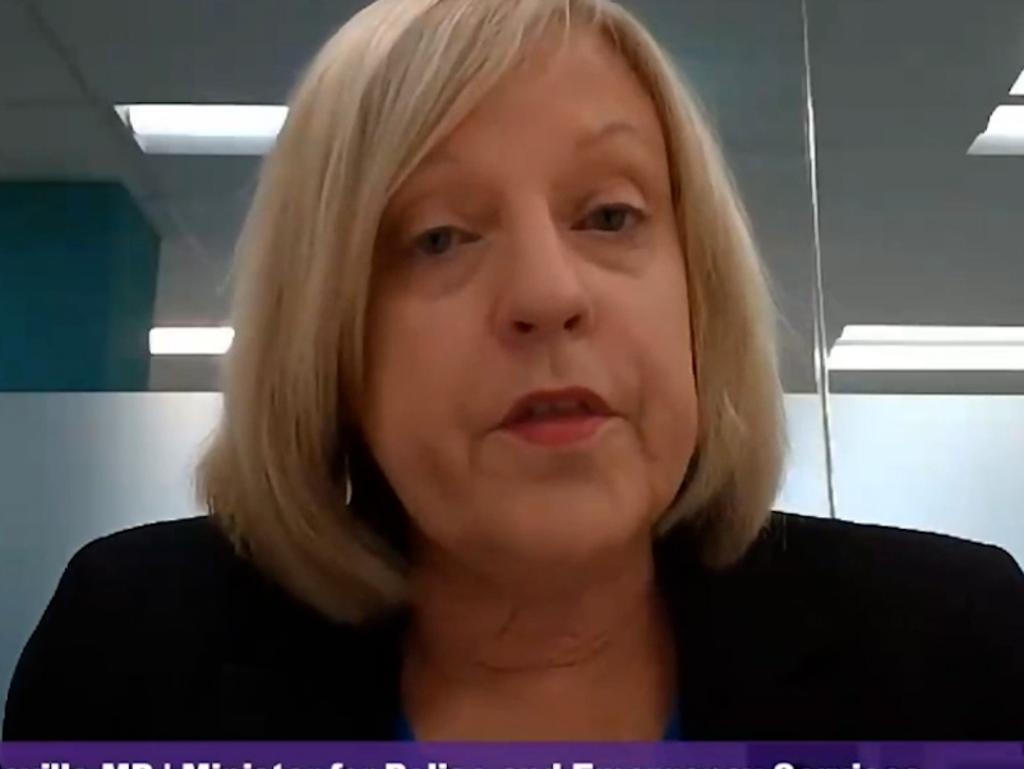
Almost all cases of Victoria’s second wave of COVID-19 can be traced to hotel quarantine.
Ms Neville said she was unsure whether the use of private security to guard the hotels was to blame for the outbreaks.
She said she did not take a view early on about whether it was appropriate to use private security to guard returned travellers.
She also said it was not within her power or responsibility to make the decision to install them or to reconsider having them.
“Reflecting on the question now, there are clearly things that went wrong with the HQP,” she said in her statement.
“I do not know whether that was because of the use of private security at all, or because of issues with the management and oversight of the private security arrangements, infection control management, or both.”
Ms Neville said the idea of using private security to guard returned travellers at hotels was already decided on the day the program was announced, but she couldn’t say whose decision it was.
She said she first heard private security would be used to guard returned travellers during a 2pm meeting with Chief Commissioner Graham Ashton and Mr Crisp.
“The involvement of DJPR (Department of Jobs, Precincts and Regions) or use of private security were not raised for a decision in that meeting or for any particular input by me,” she said.
“It was clear to me … a decision had already been taken on the front line of enforcement at the hotels.”
She said private security was raised by Mr Crisp and the potential role of defence force personnel was raised by Mr Ashton.
“If there had been any serious consideration of Victoria Police playing a significant role in hotel quarantine program, in my view I would have been consulted,” she told the inquiry.
She said the use of private security “didn’t jump out at me as a major issue” given their use at major events.
She said the focus for ADF at that time was on potentially providing an escorting role at airports.
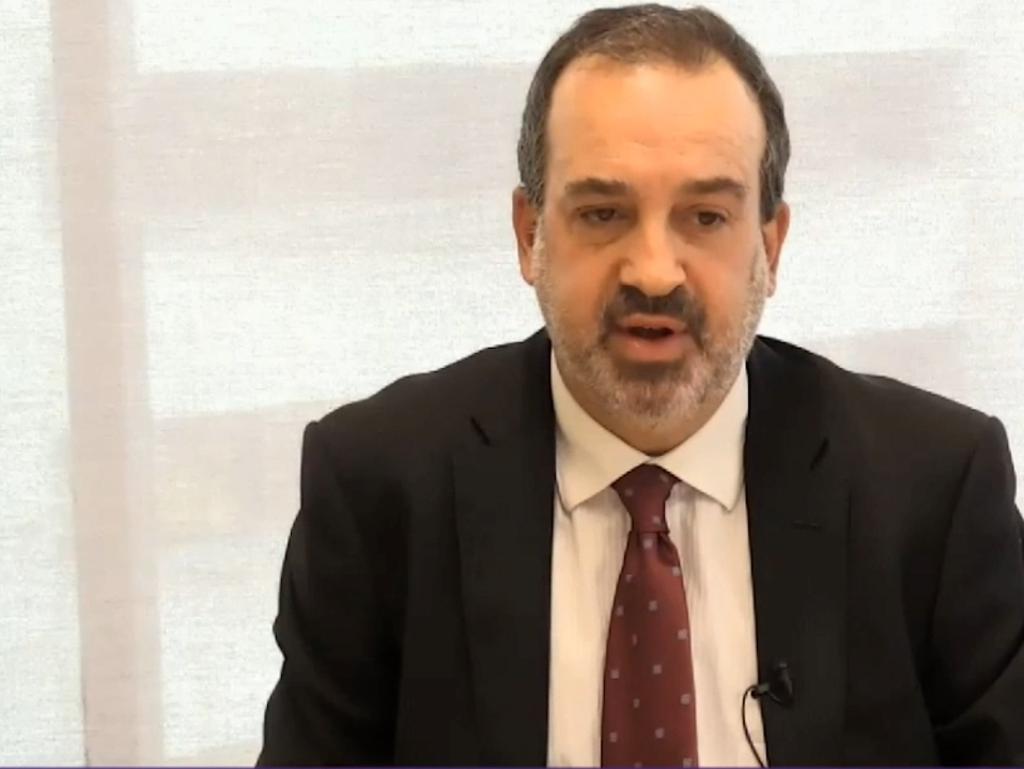
Jobs Minister Martin Pakula, whose department was responsible for the logistics of the program, also couldn’t say who decided on private security for the hotel scheme.
He said the Department of Health and Human Services was in charge of the program, with his department having an assisting role, with logistical support.
“There was, to my understanding, one department which was in charge, if you like, and had overall responsibility, and my department, whose role was to assist the control agency, which was in this case DHHS,” he said.
Mr Pakula was asked for the clarification by inquiry chair Jennifer Coate, after Ms Peake yesterday said there was a ‘shared accountability’ for the hotel quarantine scheme.
Mr Pakula’s department arranged the contracts for hotels, security and cleaning.
But he said it would have been preferable for the agency with overall responsibility to also be responsible for managing contracts.
The inquiry has heard two of three companies contracted to provide security services were “preferred” by Trades Hall.
Mr Pakula said he didn’t become aware of any concerns about the program until after the high-profile inquiry was established.
“I became aware some time after the establishment of this inquiry there’d been certain representations made by my department to other agencies about various aspects of the program,” he said.
Mr Pakula was asked by counsel assisting Rachel Ellyard whether making security companies responsible for infection control during a pandemic posed significant risks.
“My view would be I think it’s appropriate to put some obligations on those parties that are contracted,” Mr Pakula replied.
“I don’t take from it a suggestion there were no obligations on anyone else in addition to that.”
Ms Mikakos will appear at the inquiry on Thursday, followed by Premier Daniel Andrews on Friday.

